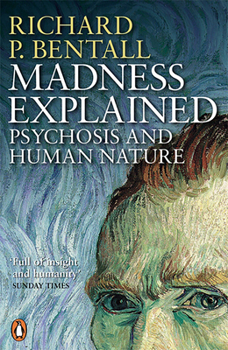Madness Explained: Psychosis and Human Nature
Select Format
Select Condition 
Book Overview
A revised edition of the groundbreaking classic on mental illness Is madness purely a medical condition that can be treated with drugs? Is there a clear dividing line between who is sane and who is... This description may be from another edition of this product.
Format:Paperback
Language:English
ISBN:0140275401
ISBN13:9780140275407
Release Date:April 2004
Publisher:Penguin Group
Length:656 Pages
Weight:1.02 lbs.
Dimensions:1.2" x 5.0" x 7.8"
Age Range:18 years and up
Grade Range:Grade 12 and higher
Customer Reviews
5 ratings
thorough
Published by Thriftbooks.com User , 16 years ago
I do not agree with all the positions defended by the author (and indeed, recent studies have not been kind with some of the proposals defended at the time by the author--to cite one example, there does not seem to be empirical support for a "bad-me" vs "poor-me" typology of paranoia). This said, the goal of a new science is not to guess it right, but to conduct experimental research with a critical judgment of its limits, and on this regards, Madness Explained offers a challenging and critical stand on "schizophrenia" that no clinical nor researcher in the field should ignore.
It's about time for a book like this!
Published by Thriftbooks.com User , 16 years ago
Informative and in-depth, without being dry, stuffy and jargon-y like many psychology/psychiatry books are. Don't be intimidated by the size of this book, it's a very easy read and well-written. The author even manages to inject some humor every now and then. It's a great explaination of the theories and history of schizophrenia, bipolar and unipolar, with an emphasis on schizophrenia and related psychotic disorders. The author goes into detail about the history of psychology and psychiatry, and names a lot of people I've never heard of. We've all heard of Freud, but what about Kraepelin, Bleuler, Laing or Mosher? I also like that the author gives a nod to the antipsychiatry movement, and has no holds barred about discussing the history of facism, the Nazi regime in psychiatry, and abuse of psych ward patients in history. The thing I like most about this book is it humanizes people we would otherwise be inclined to write off and discard because they are 'insane'. This should be required reading for anyone studying psychology or psychiatry.
Outstanding, well-researched treatise
Published by Thriftbooks.com User , 18 years ago
An outstanding, research-based treatise exploring the precise mechanisms of mental illness, and the thin line separating "normal" from "abnormal" functioning. Bentall meticulously debunks the labels upon which the dominant understanding of mental illness rely, such as "schizophrenia" and "manic depression." Experiences such as delusions and voices are things to which we are all vulnerable, and Bentall explains just why and how this is so. I really enjoyed the chapters exploring research on depression, mania, delusions, paranoia, and hallucinations. This book is a dense 640 pages, so it is not for the casual reader. For a lighter reading on much the same topics, I would also recommend Bentall's co-authored text, Models of Madness: Psychological, Social, and Biological Approaches to Schizophrenia.
Lunatic Or Just A little "Touched"?
Published by Thriftbooks.com User , 19 years ago
There is an awful lot of terminology in psychiatry such as "neurotransmitters", "dopamine, blockage of seratonin receptors", and "misfiring" of the brain. However, in good faith these professional mental curers will openly admit that they don't know how any of these connections or "misfires" of the brain work as they hand out little pills that are experimental ( I come from a medical background, father retired pharmacist, sibling a psych nurse, and late grandfather an M.D., so I hear about this). Bentall brings up a good point regarding madness and how society views it and treats it. 1) This is another subject that no one wants to really talk about, and find it bothersome. 2) One can run to a doctor and get an easy cure pill that if you do not research it, you will gain about 40 lbs within six months. 3) You can choose to go to therapy and talk about it, and dig into your problem/s (Hopefully you have good insurance that covers this sort of treatment). Bentall also argues that maybe there is perhaps nothing really serious going on, perhaps it is just human nature. Some people are just erratic by nature, but then what is erratic? What is considered normal to someone or what is considered mad is the question. There is the old cliché of the mentally ill person begging on the street, or directing traffic in a busy intersection, but surely there are "mentally ill" well dressed people working in large offices holding prestigious titles or big celebrities that are "acting that way". Think about the great geniuses that were considered "mad" such as Sylvia Plath, Ann Sexton, E. Hemingway, Allen Poe, Mary Shelly, Mozart, and many more. Was it just human nature? I found this book very helpful.
A very human presentation of madness
Published by Thriftbooks.com User , 19 years ago
I found this book very nice mainly because it demystifies the topic of madness. The book starts with a little of history about psychology, giving the reader enough context to build up a critical view of psychology. Throughout the book, the author tries to disentangle many biases in psychology and psychiatry to show that madness is not that bad, and that many behaviors we take as common are very close to that. The book is quite long and involved, i think it is its main drawback. However, it is worth reading as it provides a lot of examples of everyday behaviors that might easily lead to some form of madness. Personally, i cannot consider madness as being anything else tham simply a "socially annoying" thing. People considered as "mad" are sometimes less mad than supposedly normal persons, most people just don't want to try to understand them.





